7 Reasons to Use Carminative Herbs
Carminative herbs are plants that contain volatile compounds that have traditionally been used for their pharmacological properties to benefit human health. Primarily, the phytonutrients in these herbs have therapeutic effects in supporting digestive health and influencing overall well-being. One of the most common carminatives used today, peppermint, was even referred to in the writings by Hippocrates when he references its plant structure the Mentha Piperita L (1).
Carminatives are present in many uses today such as gum, bitter liqueurs, food preparation, toothpaste, and herbal teas. Adding carminative herbs into your diet and even into the air you breathe can have a profound impact on reducing gas, after dinner bloating, nausea, and more. This article discusses 7 reasons to use carminative herbs to improve your health.
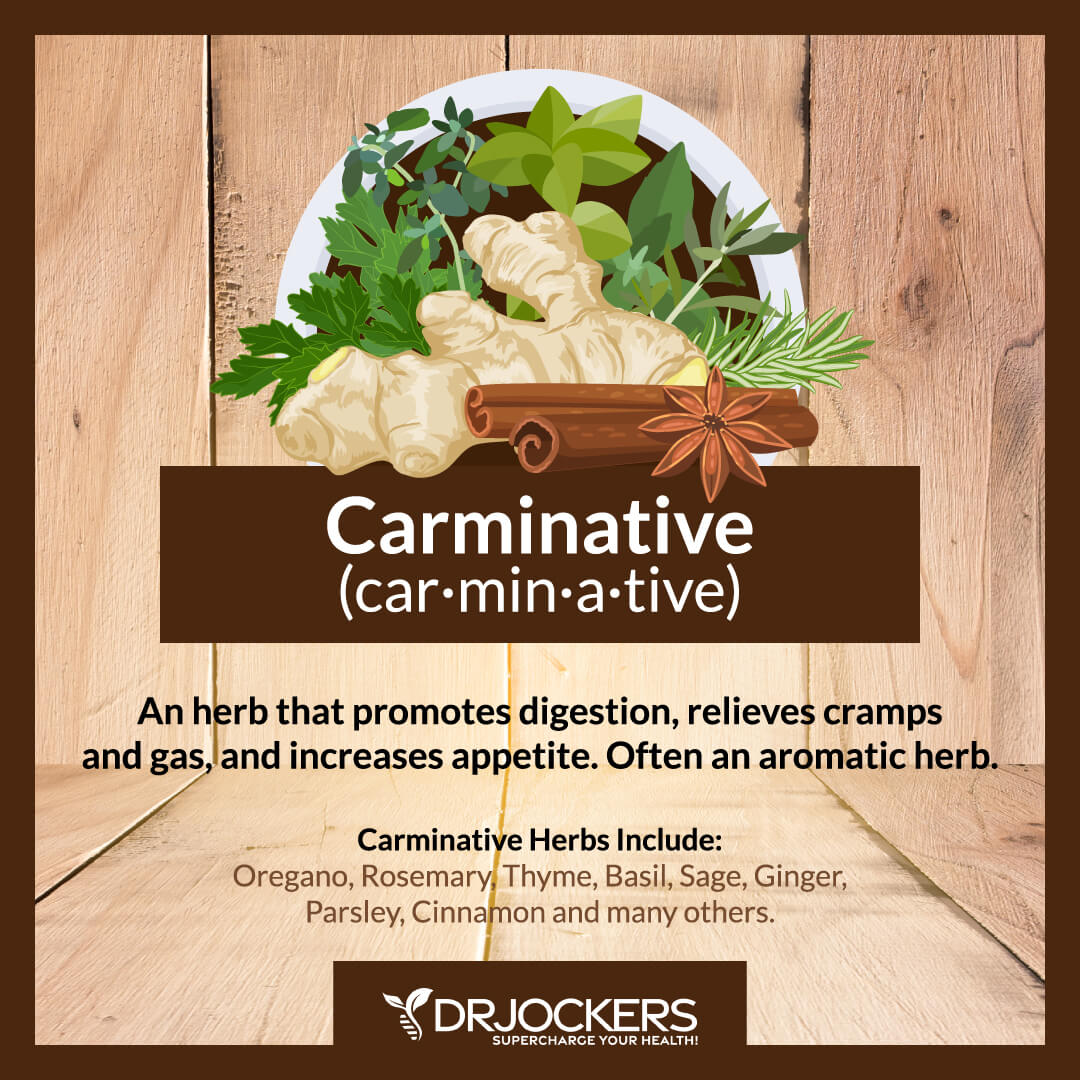
Common Carminatives Herbs
Foods such as onions and garlic contain carminative properties, but you likely already use some of the most common carminative herbs without knowing it. Unless you prefer fruity flavorings, your gum, and mints likely contain spearmint or peppermint. The following is a list of carminative herbs which can relieve symptoms of morning sickness to treating infant colic: (3, 4, 5, 7, 8)
Here is a list of all the best carminatives. As you can see, even avocado is listed as a carminative and it helps to relieve these digestive symptoms, however, it isn’t as powerful as others such as ginger, peppermint, fennel, etc.
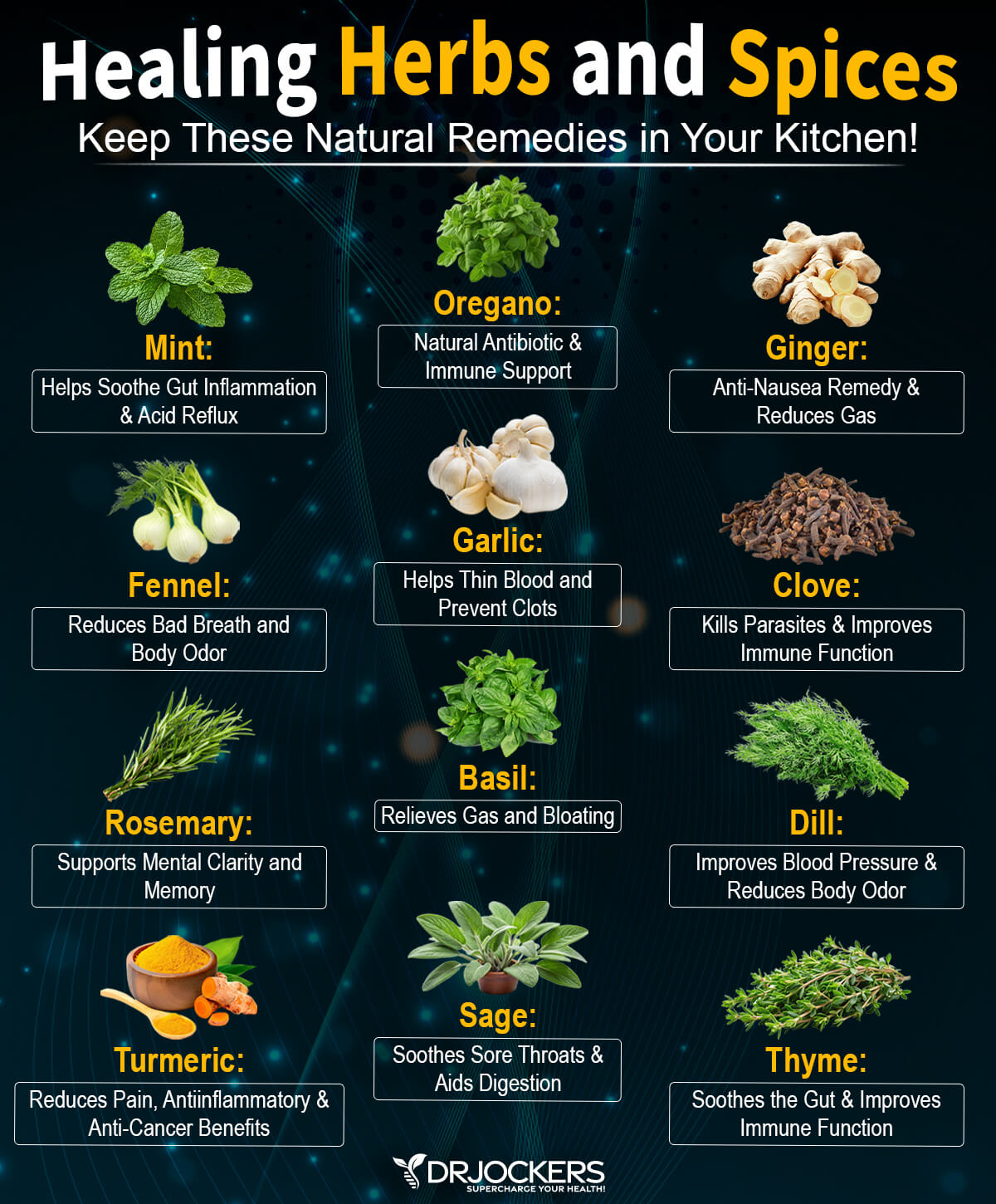
How Carminatives Improve Digestion
Many of the foods we eat and the way we eat foods today contribute to an increase in flatulence, bloating, cramping, and chronic problems. Perhaps you are eating your meals too often on the run, barely tasting or chewing what you put into your mouth, or you may be suffering from more abdominal discomfort throughout the night because your schedule has you eating dinner too close to bedtime. Carminative herbs may provide the solution you need to tame your digestive discomfort.
In general, carminative herbs can be referred to as exhibiting activity that as a result functions as a bowel cleanser (2). Here is how carminative herbs work within your body: (3, 7)
1. Modulate Intestinal Contractions: Reduce the force and spontaneity of intestinal contractions: Cells that line the intestinal membrane and smooth muscle cells are aggravated.
2. Stimulate Bile Flow: This is necessary to increase fat digestion: Compounds within the oils are broken down which promotes the movement of bile substances such as bile salts from the liver, into the bile duct, and then into the intestines. The material that is not excreted as feces will be recycled.
3. Reduce Surface Tension Within the Intestines: Oxygenated compounds like terpenes increase in activity and small water bubbles are combined to form larger water droplets. Naturally, this reduction in force also decreases abdominal pain.
4. Exhibits an Anti-Foaming Action: Lowers the content of CO2 bubbles created by gut bacteria by binding smaller bubbles together into larger bubbles. These gas pockets are then expelled more readily from the intestines reducing gas discomfort.

7 Therapeutic Uses of Carminatives:
Carminative herbs display various chemical profiles that are used to treat an array of digestive discomforts.
1. Antimicrobial: Many of the herbs are characterized by antimicrobial properties that can heal your gut microflora and destroy harmful bacteria, sweet fennel being one of those herbs. For this reason, carminatives have been used to treat respiratory problems due to infection and gastrointestinal disorders. (8)
2. Irritable Bowel Syndrome: Clinical studies have shown that oils extracted from these herbs can treat symptoms of IBS. Peppermint oil in particular releases a strong menthol odor which significantly can increase gastric flow and prevent stagnation associated with constipation. (6)
3. Chemo-Protectant: Carminative herbs contain powerful antioxidants that can prevent cancer development. The flavonoids contained in orange peel help repair tissue and strengthen blood vessels (3). Peppermint is also, yet again, an excellent choice for chemo-protection. (6)
4. Relieves Symptoms of Nausea: Carminative herbs have been shown to treat nausea resulting from both motion and morning sickness. Some of these types of herbs are anise seed, ginger, cardamom, and peppermint. Anise seed also has the potential to stimulate breast milk production in nursing mothers. (3, 9)
5. Reduce Need for Medication: Extraction methods using a steam distillation process allow some of these carminative herbs to have very strong volatile oils (1). One study showed that essential oil blends of ginger, peppermint, and cardamom have the potential to treat conditions aromatically (9). Patients in this study who inhaled the oil blends felt less need to consume medicine prescribed to treat symptoms of nausea following an operation.
6. Treat Menstrual Symptoms: Spices like cardamom and peppermint can effectively numb the stomach and intestinal nerves which leads to pain from cramping and gas. These carminative herbs can limit muscle cramping which occurs during a woman’s menstrual cycle. (3)
7. Diuretic: Sweet fennel is a great source of trace elements and a source for calcium and magnesium essential for overall health and development. This herb functions as a diuretic and is effective and safe in children and pregnant women.
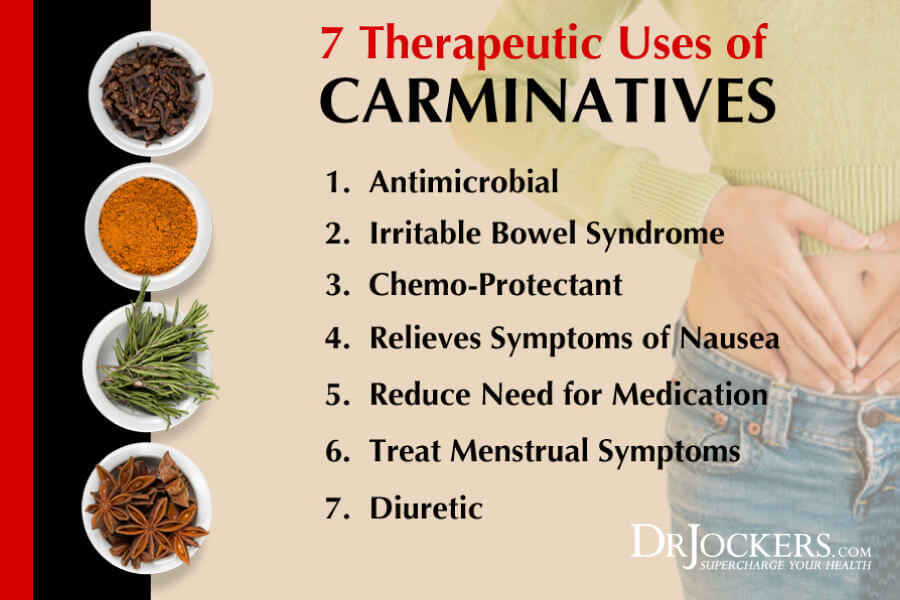
Contraindications for Carminative Herb Use
Some precautions are needed to be taken before adding carminative herbs into your diet. Researchers have found that individuals easily prone to heartburn or conditions involving chronic reflux such as GERD avoid or use carminative herbs conservatively (3).
One study has shown that as briefly as less than 10 minutes following the ingestion of a carminative herb, the lower esophageal sphincter becomes relaxed and remains open for a significant period of time. The time period at which this sphincter remains open is critical to limiting the acidic mucous from the stomach building back up into the esophagus and thereby creating the sensation of heartburn. (1)
There is a lot of debate in this regard, as ginger and other carminative herbs have helped many people with GERD. I suggest using them and seeing how you respond. Do you feel as though you have more or less symptoms of GERD. The vast majority do really well with them.
Ginger should be avoided if you will be undergoing surgery within a week. Ginger exhibits blood thinning properties which can also negatively affect individuals taking blood thinning medication and should not be used. (3)
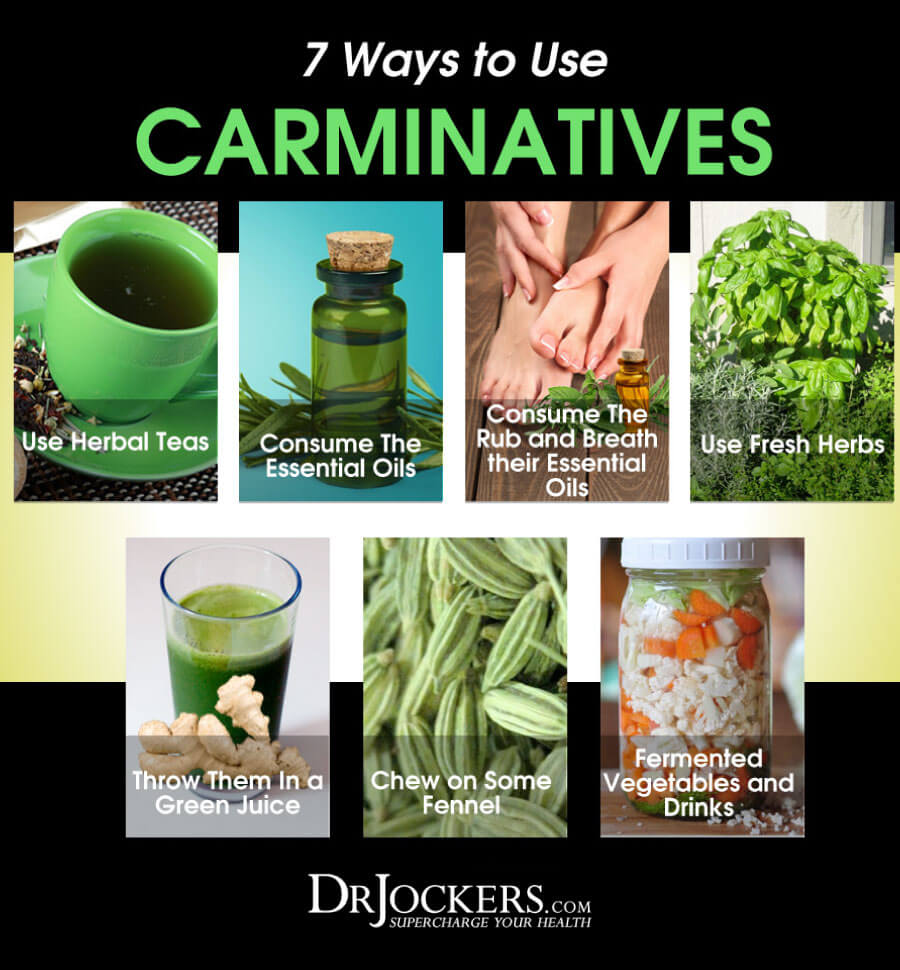
7 Ways to Use Carminative Herbs:
- Use Herbal Teas: This is something I do daily and recommend to all of my clients. I love using ginger tea, peppermint tea or combinations of these in various blends. There are so many great varieties out there that you can find at your local health food store.
- Consume, Rub and Breath their Essential Oils: You can also soothe abdominal discomfort by combining a carminative essential oil with coconut oil and applying to the skin and massing into the tissue around the abdominal region. You can also diffuse them in the air and breath in the benefits or use small amounts and consume them in your meals.
- Use Fresh Herbs: You can apply many of these to meat and vegetable dishes on a regular basis. I love Italian herbs like rosemary, thyme, basil, oregano, etc. which all have great carminative effects.
- Throw Them In a Green Juice: You can juice small pieces of ginger, mint, etc. in your green juicing.
- Chew on Some Fennel: Fennel seeds are a fantastic breath freshener, as is peppermint. Keep these around instead of tic-tacs or altoids which are full of toxic chemicals.
- Fermented Vegetables and Drinks: I LOVE fermented ginger, it is very common in Asian cultures and often comes with sushi dishes. You can also find fermented ginger in kimchii blends and with various blends of coconut water kefir. I love the KeVita Mint Lime coconut water kefir and the Lemon Ginger blend as well.
- Supplement with a Carminative Herb Blend: You can take a carminative blend to help support digestive health. We recommend the Digestive Enzymes Chewable which has gentian, dandelion, lemon balm, fennel and ginger in clinical dosages to get the best results.
Summary
Adding carminative herbs into your lifestyle is as simple as making a few new spices part of your repertoire or inhaling the aromas of an oil in a diffuser. Traditional Medicinals offers a line of herbal teas with many of these carminative herbs in their organic tea blends for your digestive comfort (4). How will you supplement carminative herbs into your daily routine to improve your health?
If you want to work with a functional health coach, I recommend this article with tips on how to find a great coach. On our website, we offer long-distance functional health coaching programs. For further support with your health goals, just reach out—our fantastic coaches are here to support your journey.
Inflammation Crushing Ebundle
The Inflammation Crushing Ebundle is designed to help you improve your brain, liver, immune system and discover the healing strategies, foods and recipes to burn fat, reduce inflammation and thrive in life!
As a doctor of natural medicine, I have spent the past 20 years studying the best healing strategies and worked with hundreds of coaching clients, helping them overcome chronic health conditions and optimize their overall health.
In our Inflammation Crushing Ebundle, I have put together my very best strategies to reduce inflammation and optimize your healing potential. Take a look at what you will get inside these valuable guides below!
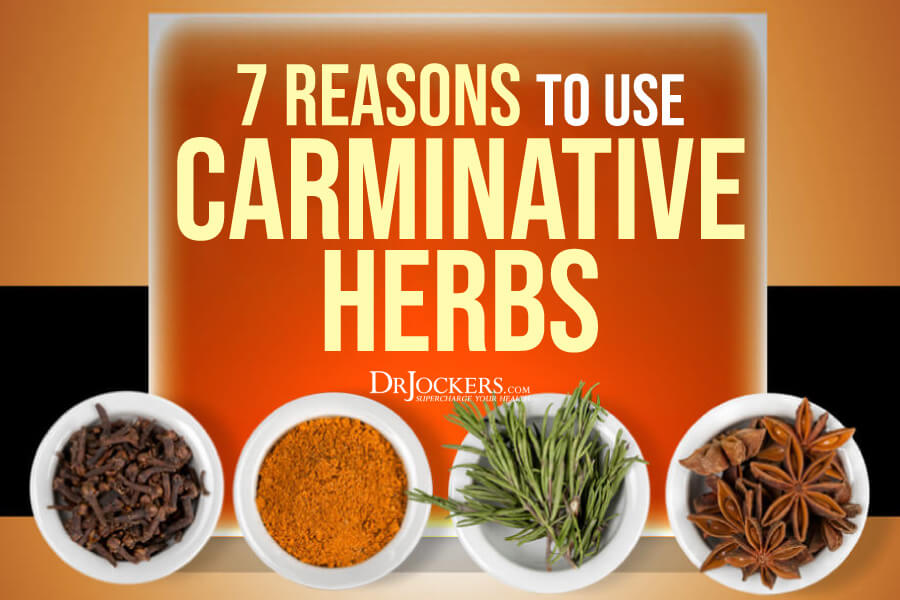






I am just learning about carminatives. Thank you for the list of herbs as well as how to use these in my life.